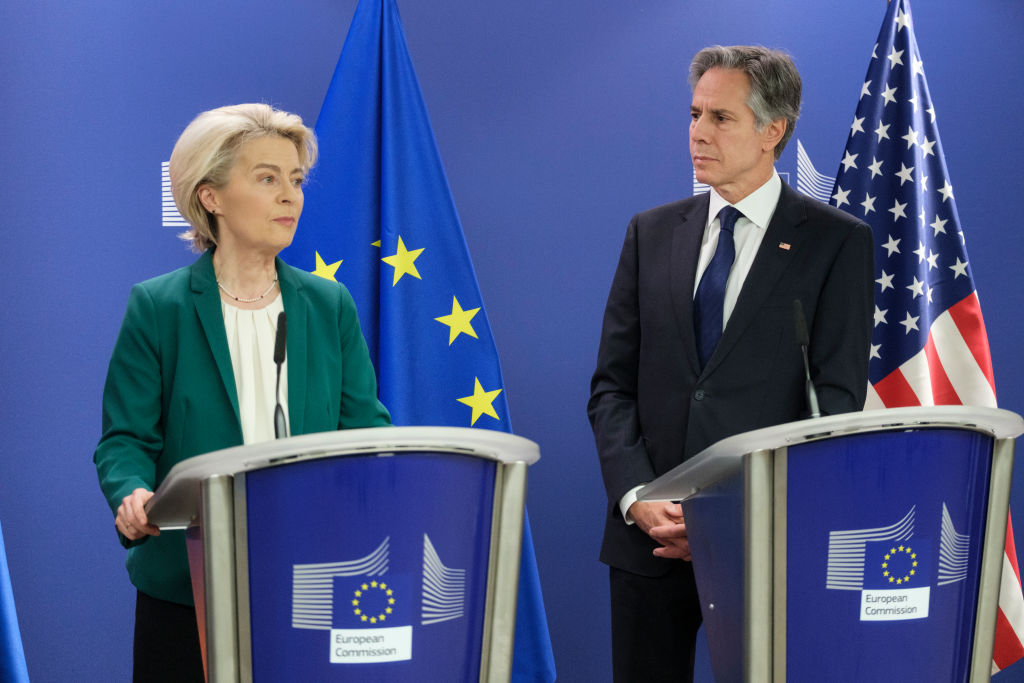EU-US relations could be in jeopardy amid promises by Michael McGrath, the European Commission’s tech enforcer-designate, that he will work to increase tech regulation and what some American politicians call EU online censorship.
McGrath, Ireland’s former Minister for Finance and Commissioner-designate for Rule of Law, is set to address the European Parliament on the morning of November 5. His comments may be drowned out by the US presidential election. The timing may be a deliberate choice by the commission, since members of the US Republican Party have expressed concern that the EU’s tech regulations endanger American interests.
US Congressman and Republican House Judiciary Committee chairman Jim Jordan in September publicly expressed concern that the EU is looking to meddle in US democracy via the Digital Services Act. The Congressman dressed down former Internal Market Commissioner Thierry Breton after Breton demanded that a live online chat between X-owner Elon Musk and US Presidential hopeful Donald Trump be censored in line with EU rules.
Should McGrath’s appointment get the green light from MEPs, he has also vowed to continue Brussels’ war on disinformation and alleged foreign election interference.
McGrath is a member of the centrist Fianna Fáil party, whose MEPs sit with Renew Europe. Some say the former minister is set to become Ursula von der Leyen’s “attack dog” in Brussels, with it being his responsibility to withhold millions of euro payments due to member states that refuse to follow what the commission calls “European values”.
So far, McGrath appears to be embracing the role, vowing to launch such infringement proceedings against EU countries which resist the demands of von der Leyen’s commission, if and when necessary, as well as pursue the increasing trend of EU tech clampdown.
To this end, he has vowed to keep the trend of mass digital regulation going, putting particular focus on the much-anticipated Digital Fairness Act, the successor to the Digital Services Act and Digital Markets Act.
“The Digital Fairness Act is the missing piece of the puzzle in the EU’s digital rulebook,” he said in response to written questions from the parliament ahead of his formal EP hearing on November 5.
“The recently adopted digital legislation, such as the Digital Services Act and the Digital Markets Act, is ground breaking and will have a positive impact on consumer protection, including by providing a supportive framework for the protection of consumer rights online. Still, the conclusions of the Digital Fairness Fitness Check showed that gaps remain and we must continue to address the shortcomings identified in a targeted and proportionate way.”
McGrath has vowed to take action on issues such as “dark patterns, influencer marketing, addictive design and problematic personalisation” when drafting the DFA, adding that he will also pay “special attention” to areas of tech that influence children.
Another Brussels project McGrath promised to spearhead was the union’s proposed so-called “European Democracy Shield”, which he says will be aimed at securing EU elections “from foreign information manipulation and interference”.
“If confirmed, I consider this to be a major priority, working in cooperation with my fellow Commissioners. Democracy can never be taken for granted, and we need to protect the EU’s systems both from malign foreign interference and from erosion,” he said.
“Democracy implies strong checks and balances. I will actively work to promote transparency and integrity in the democratic sphere. Dangers to democracy can come from foreign manipulation, disinformation or from domestic risks such as erosion of democratic institutions or deterioration of participatory practices.”
Jim Jordan, chairman of the powerful House Judiciary Committee, says Breton has sent an “inaccurate” letter to his committee in an attempt to deny he was threatening to force Musk into censoring content.https://t.co/IqTGcSrSQm
— Brussels Signal (@brusselssignal) September 10, 2024
Apart from further endangering EU competitiveness, McGrath’s desire for more tech regulation is almost certain to increase tension in dealings with the United States.
While the Biden Administration has appeared friendly towards Brussels’ recent efforts in the sector — seemingly endorsing the Digital Services Act earlier this year — members of the Republican Party have expressed concern that such regulations endanger American interests.
US Senator Ted Cruz has previously sounded the alarm that the Digital Markets Act appears to unfairly target US companies, possibly giving Chinese big tech rivals an unfair advantage in the international market.
This was in addition to the complaint by US Congressman and House Judiciary Committee chairman Jim Jordan after former-Commissioner Thierry Breton attempted to interfere in the Elon Musk interview with Donald Trump. For Jordan, this represented an assault on American sovereignty and freedom of speech, much to the confusion of Eurocrats, who insisted in a subsequent letter that censoring people Brussels does not like would have no impact on free expression.
Jordan and his colleagues did not appear to be all that convinced by such arguments. Nor should they have been.
With this in mind, an increase in EU tech regulation is almost certain to further sour relations between Brussels and a possible Trump II administration. Even with a possible Harris White House there are dangers, with certain elements of the Digital Markets Act mandating “researchers” be given access to sensitive information held by US corporations likely to prompt security concerns from Democrats.
American lawmakers are not the only politicians who will likely be unhappy with some of McGrath’s promises, with many representatives within the union likely also to be concerned.
Hungarian officials in particular will likely be put on edge by some of the would-be commissioner’s responses to European Parliament questions, with McGrath appearing keen to continue Ursula von der Leyen’s regulatory war against Budapest.
“I am fully committed to the effective implementation and enforcement of EU law, including through infringement proceedings when required,” he said, before promising to regularly update lawmakers on the infringement proceedings against Hungary that are already in motion.
How such a position will impact his colleagues back in Ireland remains to be seen. McGrath’s potential to anger Washington threatens blowback in Dublin. Ireland has become increasingly reliant on corporation tax receipts from US companies, with corporation tax alone accounting for over a quarter of the country’s total tax intake in 2023. This looks set to rise again in 2024. The damage a mass exit of US corporations from Ireland because of EU interference could do is nigh-unimaginable.
COMMENT: The USA has the First Amendment, the EU has @ElonMusk. Is he up for the fight against the draconian Digital Services Act? asks Karl Pfefferkorn. https://t.co/BrrVTLCuDb
— Brussels Signal (@brusselssignal) September 3, 2024





